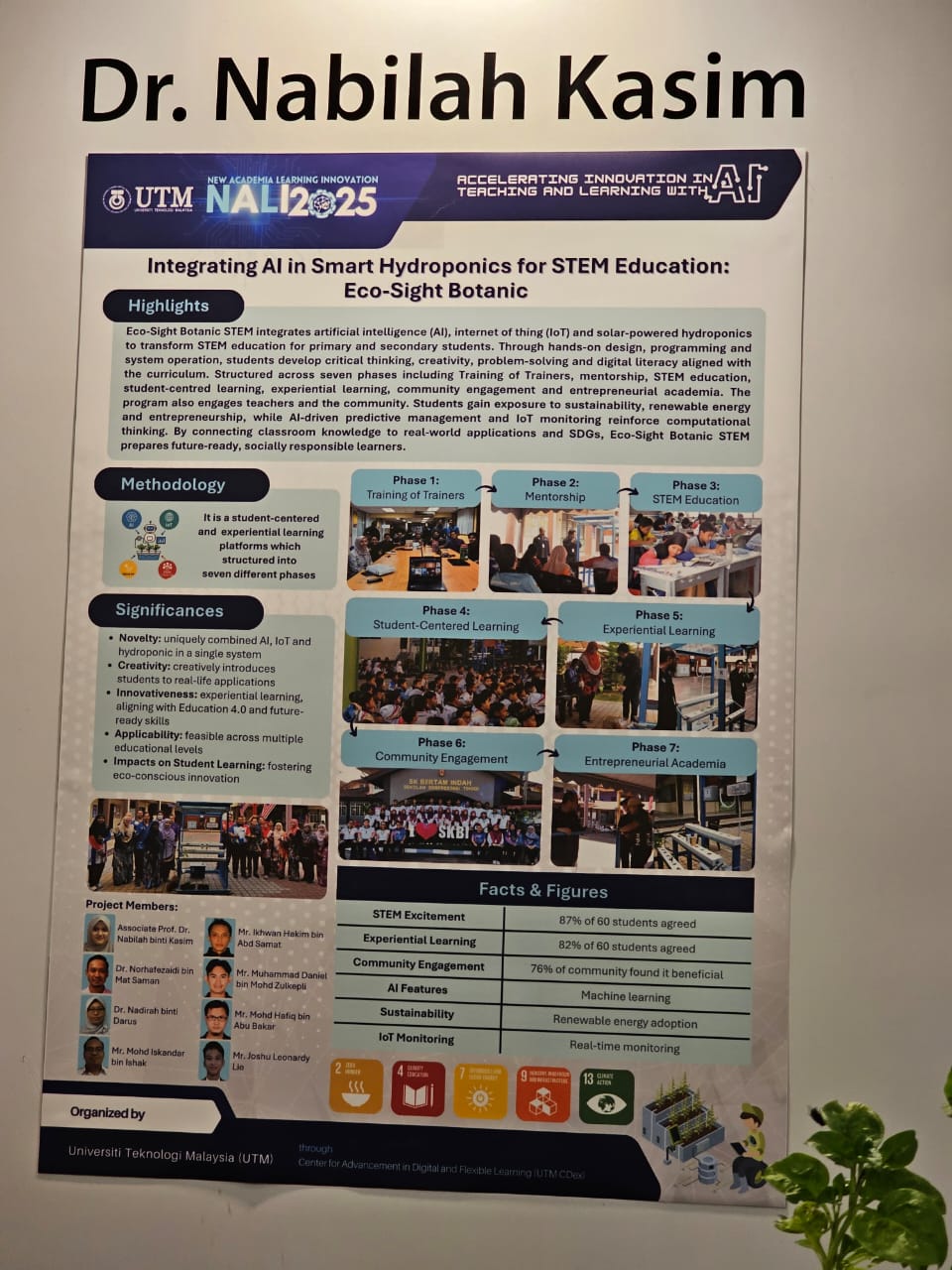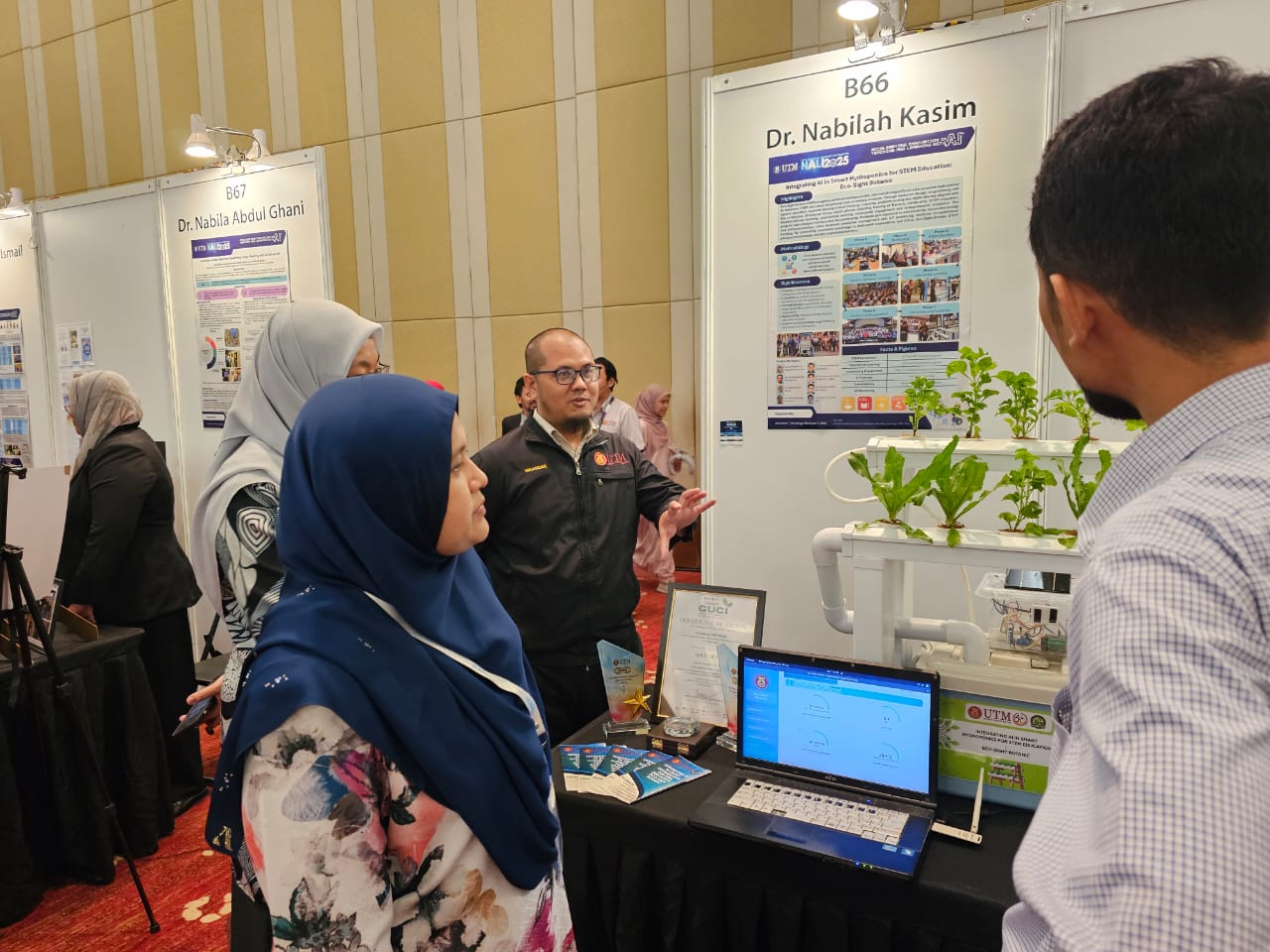In a groundbreaking step towards integrating sustainability, digital innovation, and education, researchers from Universiti Teknologi Malaysia (UTM) have developed Eco-Sight: Botanic STEM — an AI-integrated, solar-powered hydroponic system that brings real-world scientific learning into classrooms
Led by Dr. Nabilah Kasim from the Laser Center, Ibnu Sina Institute for Scientific and Industrial Research, Faculty of Science, UTM, in collaboration with experts from the Faculties of Civil, Electrical, and Chemical Engineering, this initiative aims to empower students and teachers with hands-on experience in artificial intelligence (AI), the Internet of Things (IoT), and sustainable agriculture technologies.
Bridging Technology, Education, and Sustainability
Eco-Sight: Botanic STEM integrates AI-driven predictive management, IoT-based monitoring, and solar-powered hydroponics into a single educational platform. Through this innovation, primary and secondary students learn to design, program, and operate automated hydroponic systems using microcontrollers, cloud dashboards, and sensors that track temperature, pH, humidity, and light intensity in real-time.
The program combines seven interrelated phases:
- Training of Trainers (ToT) – equipping teachers with the technical skills to manage AI-IoT systems.
- Mentorship – providing students with guidance from UTM mentors and engineering professionals.
- STEM Education Integration – linking hydroponic projects with science, mathematics, and ICT curricula.
- Student-Centred Learning – encouraging self-directed exploration and problem-solving.
- Experiential Learning – promoting hands-on understanding of plant growth and sustainability.
- Community Engagement – connecting schools, parents, and local communities through exhibitions.
- Entrepreneurial Academia – fostering innovation and business awareness through prototype commercialization
“This project transforms STEM education by linking classroom concepts to sustainability challenges. Students don’t just learn theory — they experience real-world innovation through AI and green technology,” said Dr. Nabilah Kasim, the project leader.
Empowering Students through Smart Learning
Implemented at primary schools across Johor, the Eco-Sight initiative reached 28 UTM student mentors, 20 teachers, and 60 students, creating a dynamic ecosystem of teaching, learning, and community engagement.
Survey results revealed remarkable outcomes:
- 87% of students reported increased excitement and curiosity in STEM.
- 82% connected classroom learning with real-world applications.
- 76% of community participants found the program valuable for promoting sustainability awareness.
Students observed how AI algorithms forecast nutrient needs by analyzing pH, electrical conductivity (EC), and growth patterns, enabling proactive system adjustments. This hands-on exposure helped learners grasp machine learning concepts and computational thinking in a tangible way
The hydroponic system’s solar photovoltaic (PV) power supply further demonstrates sustainable energy use, teaching students about renewable power generation and eco-efficient technology. The IoT dashboard enables continuous monitoring and alerts for system anomalies, promoting data-driven decision-making and scientific observation.
Inspiring Future Innovators and Green Entrepreneurs
The project not only enhances STEM understanding but also cultivates an entrepreneurial mindset among students. Participants were encouraged to turn their hydroponic prototypes into school-based innovations or commercial kits. This approach aligns with UTM’s vision of entrepreneurial academia, where research and education lead to societal impact.
“Eco-Sight helps young learners realize that science and innovation can solve real problems — from food security to renewable energy,” added Dr. Nabilah.
Through partnerships with teachers and local communities, the project embodies UTM’s commitment to sustainability education and the United Nations Sustainable Development Goals (SDGs):
- SDG 2 – Zero Hunger (through sustainable food production)
- SDG 4 – Quality Education (via experiential STEM learning)
- SDG 7 – Affordable and Clean Energy (with solar power integration)
- SDG 9 – Industry, Innovation, and Infrastructure (through AI and IoT applications)
- SDG 13 – Climate Action (by promoting eco-friendly practices).
A Model for Future-Ready STEM Education
Eco-Sight: Botanic STEM represents a new model of education that blends science, technology, engineering, and sustainability. The initiative demonstrates that when AI, IoT, and renewable energy are integrated into education, they cultivate future-ready, socially responsible learners equipped with both digital and environmental literacy.
“This innovation bridges the gap between classroom learning and the real world. It encourages students to think like scientists, engineers, and changemakers,” said Dr. Nabilah.
The project’s success underscores UTM’s leadership in STEM innovation and sustainability, proving that experiential learning can inspire a generation of young thinkers who will drive Malaysia’s green and digital future.
📍 Project Title: Eco-Sight: Botanic STEM – Integrating AI and Smart Hydroponics for STEM Education
👩🏫 Principal Investigator: Dr. Nabilah Kasim, Laser Center, Ibnu Sina Institute for Scientific and Industrial Research, Faculty of Science, UTM
📧 Contact: k.nabilah@utm.my
🔗 Explore more STEM and sustainability innovations at: https://science.utm.my/utmfsresearch/



